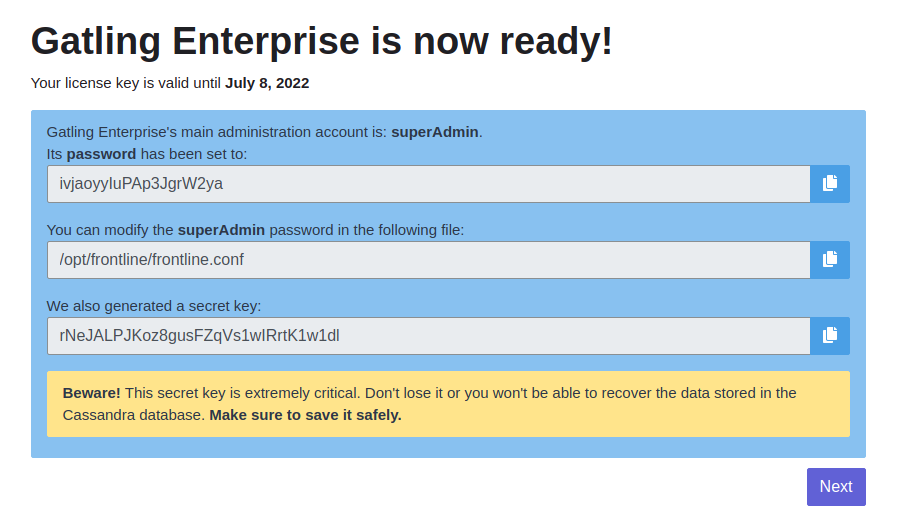Configuration
First time configuration of Gatling Enterprise and content of the default configuration file.
Configuring Gatling Enterprise
The first step before using Gatling Enterprise is to configure your license key.

Once you’ve filled your license and clicked on the “Next” button you will get the credentials to connect to the superAdmin account. You can change this password in the frontline.conf file.

Click on the “Next” button to finish the configuration step and restart Gatling Enterprise.
Default Configuration File
Find below the default frontline.conf file:
frontline {
#licenseKey = DO_NOT_EDIT_FRONTLINE_WILL_REPLACE_THIS
http {
port = 10542
cookieMaxAge = 604800
ssl {
#certificate = "/path/to/domain.crt" an X.509 certificate in PEM format.
#privateKey = "/path/to/domain.key" a PKCS#8 private key in PEM format. It should not require a password.
}
proxy {
#host = ""
#port = 80
}
maxRequestSize = 20 KiB
}
injector {
sshPort = 22 # port used to connect to the injectors over SSH to upload the packages and launch the tests (this option doesn't control the SSH server on the injectors, only the client side connection)
httpPort = 9999 # port used to connect to the injectors over HTTP to fetch the stats
enableLocalPool = false
enableLocalPool = ${?FRONTLINE_ENABLE_LOCAL_POOL}
kubernetes {
disableTrustManager = true
ignoreDefaultKubeConfig = true
}
}
security {
#superAdminPassword = DO_NOT_EDIT_FRONTLINE_WILL_REPLACE_THIS # Comment password from configuration to disable superAdmin account
#secretKey = DO_NOT_EDIT_FRONTLINE_WILL_REPLACE_THIS
}
cassandra-defaults {
host = 127.0.0.1
host = ${?FRONTLINE_CASSANDRA_HOST}
port = 9042
port = ${?FRONTLINE_CASSANDRA_PORT}
contact-point = ${frontline.cassandra-defaults.host}":"${frontline.cassandra-defaults.port}
contact-point = ${?FRONTLINE_CASSANDRA_CONTACT_POINT}
}
cassandra {
# Gatling-specific configuration keys:
gatling-keyspace = gatling
replication = "{'class':'SimpleStrategy', 'replication_factor': 1}"
runsCleanup {
#maxRunsBySimulation = 30
#maxRunAge = 100
#timeOfDay = "15:10"
}
# All other configuration keys are standard keys from the Cassandra Java driver.
# See the reference configuration file:
# https://github.com/datastax/java-driver/blob/4.x/core/src/main/resources/reference.conf
basic {
contact-points.0 = ${frontline.cassandra-defaults.contact-point}
load-balancing-policy.local-datacenter = datacenter1
}
advanced.auth-provider {
#username = "hello"
#password = "world"
}
}
grafana {
#url = "http://localhost:3008/dashboard/db/frontline-requests"
}
ldap {
#host = localhost
#port = 389
#baseDn = "dc=example,dc=com"
#distinguishedName = "cn=John Doe,ou=Users,dc=example,dc=com"
#password = "secret"
usernameAttribute = uid
firstNameAttribute = givenName
surnameAttribute = sn
mailAttribute = mail
connectTimeoutMs = 5000
responseTimeoutMs = 10000
#personObjectClass = person
ssl {
#format = "PEM | JKS" PEM will trigger the pem part of the configuration and JKS the jks part
pem {
#serverCertificate = "/path/to/domain.pem"
#clientCertificate = "/path/to/domain.pem"
#privateKey = "/path/to/domain.key"
}
jks {
#trustStore = "path/to/truststore.jks"
#trustStorePassword = "secret"
#keystore = "path/to/keystore.jks"
#keystorePassword = "secret"
}
}
}
oidc {
# discoveryUrl = "https://provider/.well-known/openid-configuration"
client {
# id = "xxxxx-xxxxx-xxxxx-xxxxx-xxxxx"
# secret = "*******"
}
# responseMode = "fragment" | "okta_post_message"
# scopes = ["openid", "email", "profile"]
# jwksRefreshFrequency = 1440
mapping {
# username: "unique_name"
# firstname: "given_name"
# lastname: "family_name"
# email: "email"
}
}
}
Since 1.14.0, the
frontline.cassandra configuration object uses the standard configuration keys from the Cassandra
Java driver (except for gatling-keyspace, replication and runsCleanup). The previous configuration keys (now
deprecated) are still supported for backward compatibility, but the two configuration styles are not compatible with
each other. We recommend fully migrating to the new style.
